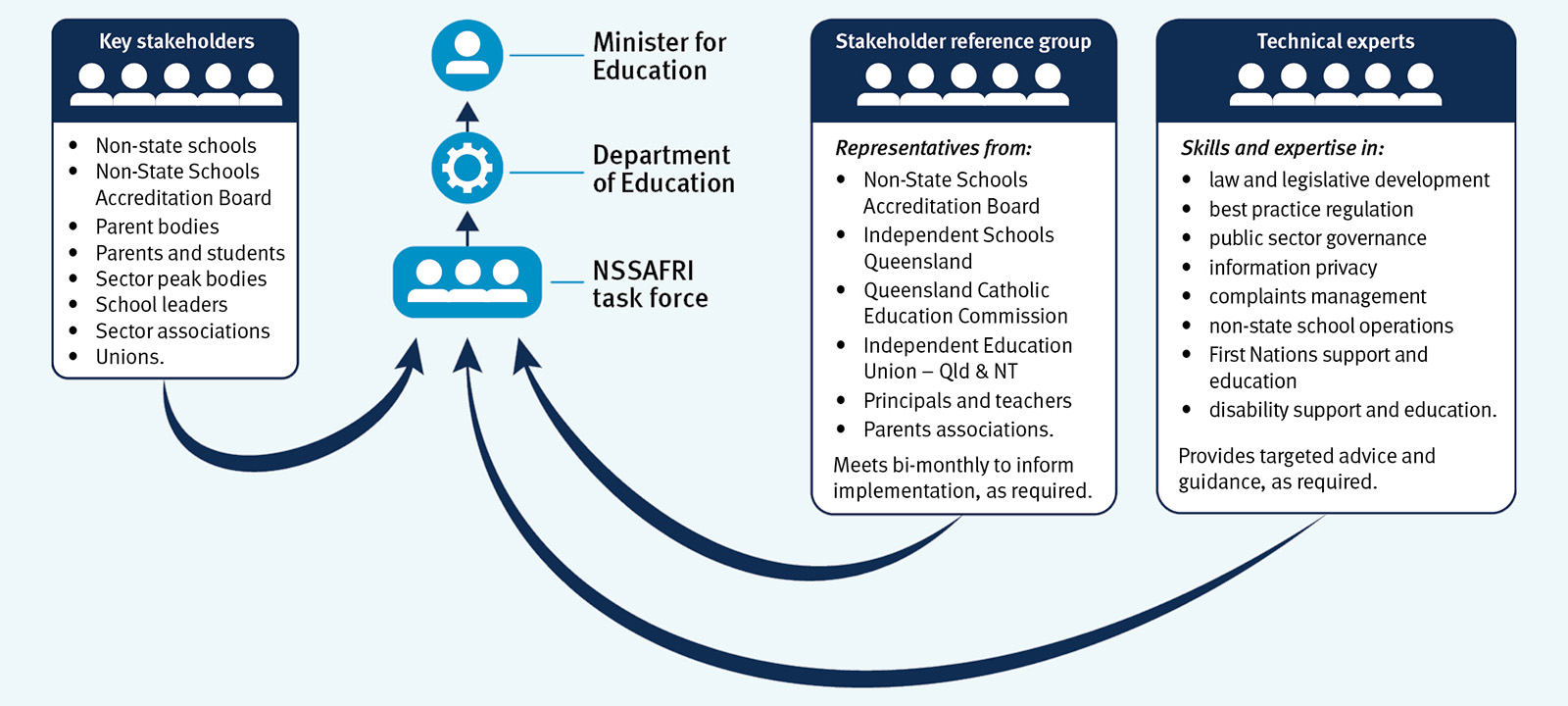An independent
review of the non-state schools accreditation framework has been completed, delivering recommendations to ensure a contemporary non-state schools accreditation framework.
The review finding made recommendations related to 4 key themes:
-
Culture, collaboration and communication: The role of Non-State Schools Accreditation Board (NSSAB) and its Secretariat provides stewardship through a collaborative culture, aiming to educate and support non-state schools to achieve and maintain compliance through clear and open communication.
-
Clarity and consistency: Non-state schools must have clear guidance about what is required of them under the legislation. This must be consistent internally and with the advice provided by other education regulators.
-
Compliance: Compliance with legislation is critical to upholding the standards the community expects. Opportunities exist to streamline compliance monitoring that can benefit schools, governing bodies and NSSAB.
-
Community confidence: Upholding community confidence in non-state schools and their regulation will occur by strengthening the regulation of student wellbeing, as well as governance of NSSAB and non-state school governing bodies.
The review was informed by significant consultation including 39 written submissions, 15 roundtables attended by approximately 170 people, a survey of Queensland non-state school parents and interviews with selected stakeholders.
Access the
20 written submissions that consented to be made publicly available.
Implementing the government's response to the review
The Queensland Government has developed a
response and the Department of Education through the non-state schools accreditation framework review implementation (NSSAFRI) task force will now implement those recommendations.
The implementation aims to ensure that all Queensland non-state schools meet minimum common standards, and that all students have access to the same basic education and safe learning environment, no matter which school they attend in Queensland.
The Queensland Government response outlines 21 recommendations that have been accepted in-principle for implementation from 2024 and a further 3, relating to the establishment of a new governance structure, to be considered further.
Implementation timelines
Implementation will occur across 2 phases:
-
Phase 1—has already commenced and will focus on immediate and short-term priorities that can be progressed without legislative or regulatory changes. These updates focus on:
- student wellbeing standards
- boarding school standards
- education program guidance
- a risk-based approach to regulation
- approach to complaints and compliance
- a case management approach to new school's accreditation
- Non-State Schools Accreditation Board governance reform.
-
Phase 2—will occur from 2025 and include recommendations that require possible legislative amendment, or further, more detailed consideration.
How we will work
Implementation activities will occur collaboratively with the non-state school sector to develop an approach that is fit for purpose, and meets the needs of the sector and the community.
The implementation is being led by the department via an internal task force. A representative group from across the sector (stakeholder reference group) will provide input and feedback to help co-create approaches to key recommendations, while technical experts will provide specific technical knowledge and advice to support the development and implementation of responses.
Targeted engagement and communication will be undertaken across the sector to keep key stakeholders informed and seek feedback at key times.
NSSAFRI task force:

- Minister for Education
- Department of Education
- NSSAFRI Task Force
- Key stakeholders
- Non-state schools
- Non-State Schools Accreditation Board
- Parent bodies
- Parents and students
- Sector peak bodies
- School leaders
- Sector associations
- Unions
- Stakeholder reference group
Representatives from:
- Non-State Schools Accreditation Boards
- Independent Schools Queensland
- Queensland Catholic Education Commission
- Independent Education Union – QLD & NT
- principals and teachers
- parents associations.
Meets bi-monthly to inform implementation, as required.
- Technical experts
Skills and expertise in:
- law and legislative development
- best practice regulation
- public sector governance
- information privacy
- complaints management
- non-state school operations
- First Nations support and education
- disability support and education.
Provides targeted advice and guidance, as required.
Download the
NSSAFRI task force diagram.
Stakeholder reference group (SRG)
A representative group from across the sector will provide input and feedback on considerations related to implementation of the Queensland Government's response to the review. Membership will include representation from:
- Department of Education (DoE)
- Non-State Schools Accreditation Board (NSSAB)
- Independent Schools Queensland (ISQ)
- Queensland Catholic Education Commission (QCEC)
- Queensland Curriculum and Assessment Authority (QCAA)
- Independent Education Union – Queensland and Northern Territory Branch (IEU-QNT)
- up to 2 teacher and/or principal nominees representing non-state schools (with 1 nominee each from ISQ and QCEC)
- Catholic School Parents Queensland (CSPQ)*.
*By agreement with Queensland Independent Schools Parents Network (QISPN), the CSPQ representative will also represent QISPN—with QISPN to provide a proxy if CSPQ are unable to attend a meeting.
Implementation guiding principles
Implementation of the Queensland Government's response to the review will occur in a way that:
- is coordinated, timely, fit-for-purpose and effective
- is informed by data and evidence
- involves collaboration and communication with stakeholders, internal and external to the Queensland Government
- best aligns with the public interest and the government's strategic priorities, such as upholding of human rights
- is broadly understood and welcomed by Queensland's non-state schooling sector and schools.
Fact sheet
Contact us
For more information, contact the implementation task force at
NSSAFRI@qed.qld.gov.au.
Please
subscribe to receive key milestone updates on the project.